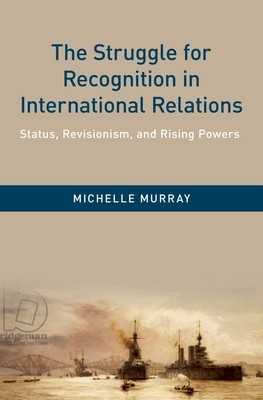
- We will send in 10–14 business days.
- Author: Michelle Murray
- Publisher: Oxford University Press, USA
- ISBN-10: 0190878908
- ISBN-13: 9780190878900
- Format: 16.3 x 23.6 x 2.8 cm, kieti viršeliai
- Language: English
- SAVE -10% with code: EXTRA
The Struggle for Recognition in International Relations (e-book) (used book) | bookbook.eu
Reviews
Description
How can established powers manage the peaceful rise of new great powers? With The Struggle for Recognition in International Relations, Michelle Murray offers a new answer to this perennial question in international relations, arguing that power transitions are principally social phenomena whereby rising powers struggle to obtain recognition as world powers. At the center of great power identity formation is the acquisition of particular symbolic capabilities-such as battleships, aircraft carriers or nuclear weapons-that are representative of great power status and which allow rising powers to experience their uncertain social status as a brute fact. When a rising power is recognized, this power acquisition is considered legitimate and its status in the international order secured, leading to a peaceful power transition. If a rising power is misrecognized, its assertive foreign policy is perceived to be for revisionist purposes, which must be contained by the established
powers. Revisionism-rather than the product of a material power structure that encourages aggression or domestic political struggles-is a social construct that emerges through a rising power's social interactions with the established powers as it attempts to gain recognition of its identity.
EXTRA 10 % discount with code: EXTRA
The promotion ends in 22d.18:45:03
The discount code is valid when purchasing from 10 €. Discounts do not stack.
- Author: Michelle Murray
- Publisher: Oxford University Press, USA
- ISBN-10: 0190878908
- ISBN-13: 9780190878900
- Format: 16.3 x 23.6 x 2.8 cm, kieti viršeliai
- Language: English English
How can established powers manage the peaceful rise of new great powers? With The Struggle for Recognition in International Relations, Michelle Murray offers a new answer to this perennial question in international relations, arguing that power transitions are principally social phenomena whereby rising powers struggle to obtain recognition as world powers. At the center of great power identity formation is the acquisition of particular symbolic capabilities-such as battleships, aircraft carriers or nuclear weapons-that are representative of great power status and which allow rising powers to experience their uncertain social status as a brute fact. When a rising power is recognized, this power acquisition is considered legitimate and its status in the international order secured, leading to a peaceful power transition. If a rising power is misrecognized, its assertive foreign policy is perceived to be for revisionist purposes, which must be contained by the established
powers. Revisionism-rather than the product of a material power structure that encourages aggression or domestic political struggles-is a social construct that emerges through a rising power's social interactions with the established powers as it attempts to gain recognition of its identity.


Reviews